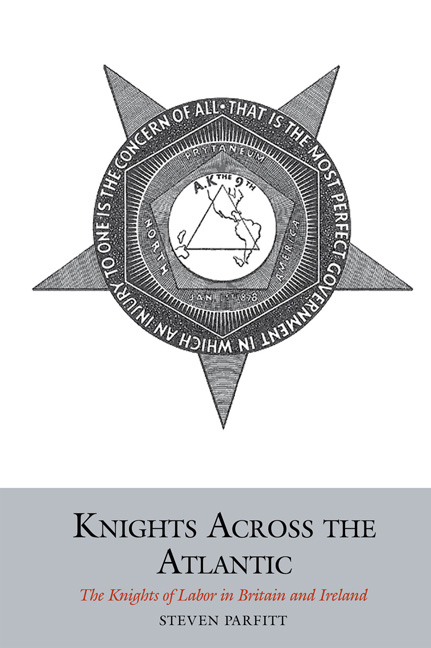Book contents
- Frontmatter
- Contents
- Acknowledgements
- Introduction: The World of the Knights of Labor
- 1 Origins
- 2 The Rise of a Transnational Movement
- 3 Organisation, Culture and Gender
- 4 The Knights in Industry
- 5 The Knights and Politics
- 6 The Knights and the Unions
- 7 The Fall of a Transnational Movement
- Conclusion: The Knights of Labor in Britain and Ireland
- Appendix: List of Known Assemblies of the Knights of Labor in England, Scotland, Wales and Ireland
- Bibliography
- Index
4 - The Knights in Industry
- Frontmatter
- Contents
- Acknowledgements
- Introduction: The World of the Knights of Labor
- 1 Origins
- 2 The Rise of a Transnational Movement
- 3 Organisation, Culture and Gender
- 4 The Knights in Industry
- 5 The Knights and Politics
- 6 The Knights and the Unions
- 7 The Fall of a Transnational Movement
- Conclusion: The Knights of Labor in Britain and Ireland
- Appendix: List of Known Assemblies of the Knights of Labor in England, Scotland, Wales and Ireland
- Bibliography
- Index
Summary
A.J.P. Taylor wrote of Napoleon III that, ‘like most of those who study history, he learnt from the mistakes of the past how to make new ones.’ The early leaders of the Knights of Labor also drew a number of very important lessons from the history of the American labour movement in the 1870s. The strikes, protests and occasional riots in the United States during that decade ended with the destruction of many trade unions and the decimation of many others after their repression by employers, their hired private detectives, local police, state militias and, especially in 1877, the United States Army. Even when workers won their strikes, their gains often failed to make up for the wages lost during them. Uriah Stephens, Terence Powderly and most other leading Knights concluded that strikes were best avoided wherever possible. Arbitration and negotiation with employers, they argued, would settle the wage disputes of the future. Over time, workers would educate and then emancipate themselves from the wage system altogether through a network of cooperative enterprise.
The struggles of the 1880s put these lessons to a severe test. The staggering growth of the Knights of Labor from 100,000 members in 1885 to nearly 1 million in 1886 came about as the result of widespread strikes, especially the victory of Knights over Jay Gould, the most notorious speculator of the day, in a strike against his Southwestern railroad system in 1885. American workers entered the assemblies to strike and win, or they struck first and joined the Knights afterwards. Many Knights conducted boycotts, a tactic adapted from the struggles of the Irish Land League at the beginning of the decade, to bring their employers to heel without leaving work. During the Great Upheaval, American workers seldom had the patience or the desire to submit their grievances to arbitration. American employers also remained unwilling to deal with organised labour unless the threat of successful strike action left them no choice. They desired mainly to wipe out the labour movement altogether, and their attacks on the assemblies were a major cause of the Order's decline. Only the leaders of the Knights of Labor seemed interested in replacing conflict with conciliation. At the same time, the Order's experiments in cooperative enterprise generally failed because of either a lack of capital or the obstruction of rival corporations.
- Type
- Chapter
- Information
- Knights Across the AtlanticThe Knights of Labor in Britain and Ireland, pp. 109 - 134Publisher: Liverpool University PressPrint publication year: 2016



